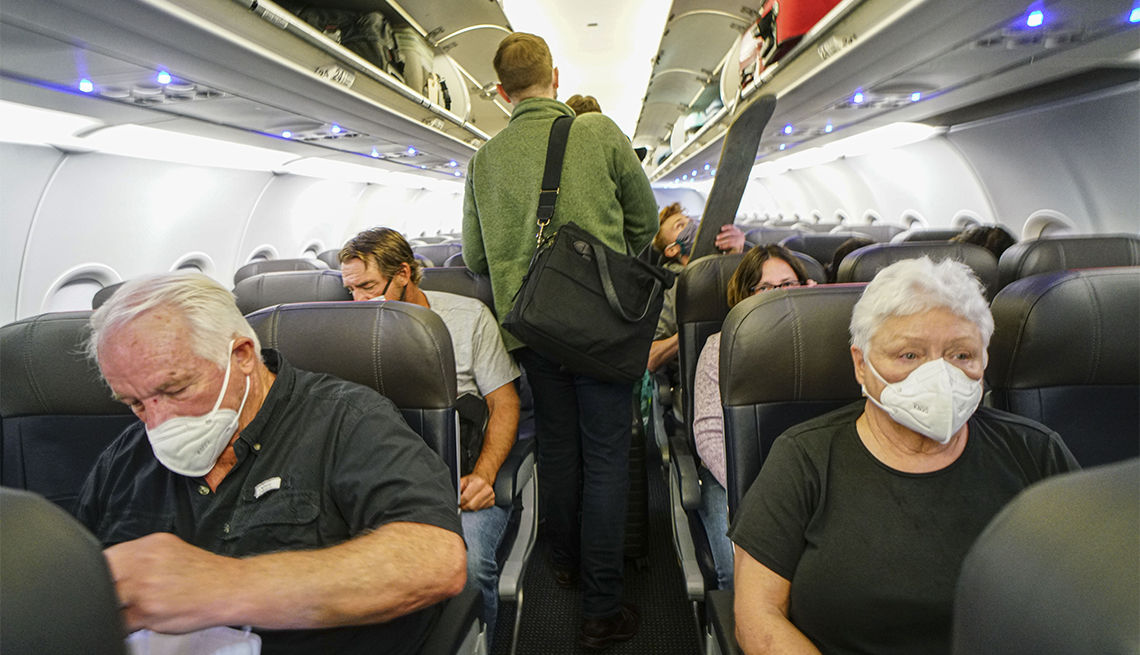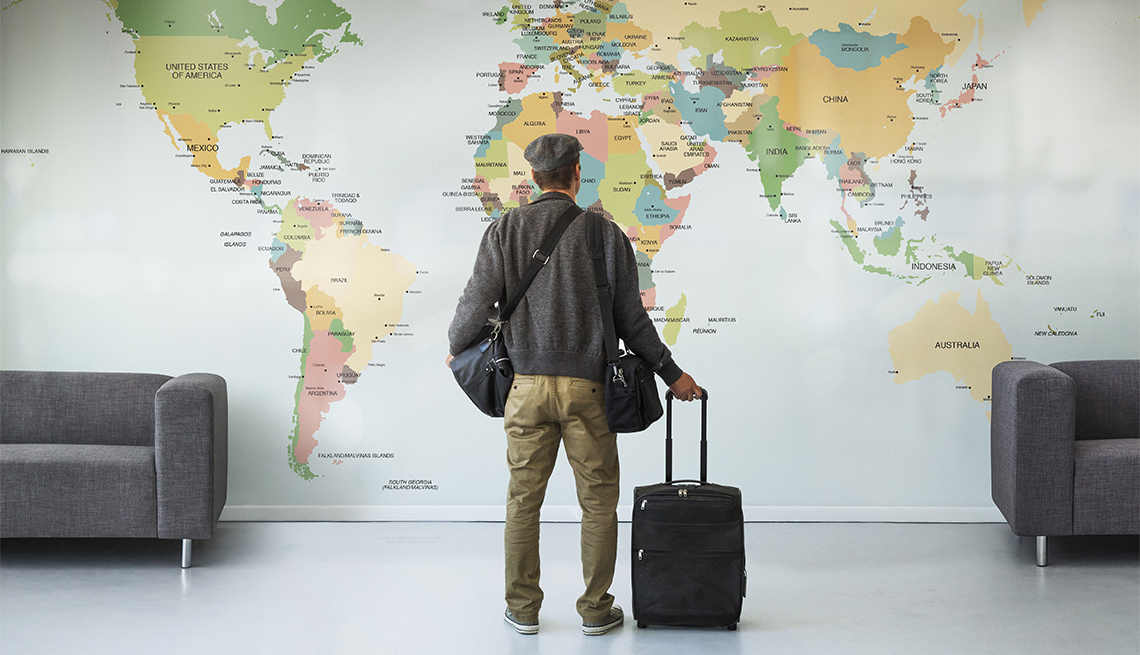Coronavirus and Travel: What You Should Know

People walk past a sign advising about social distancing on the boardwalk during the Memorial Day holiday weekend amid the coronavirus pandemic on May 23, 2020 in Ocean City, Maryland
For travel within the U.S. the CDC recommends asking:
• & bull; Whether COVID-19 is spreading in your neighborhood or the location you’re checking out. If so, you may have a greater opportunity of becoming infected or infecting others.
• & bull; If you or a liked one who is returning home has a hidden condition that might increase the danger for issues from the illness.
• & bull; If you’ll have the ability to maintain a 6-foot range in between yourself and others during travel and at your destination
• & bull; Whether the location needs that visitors quarantine themselves for 2 week upon arrival.
As noted above, New york city, New Jersey and Connecticut have advised travelers from states with high varieties of COVID-19 infections (those with a positive test rate higher than 10 per 100,000 citizens, or greater than a 10 percent test positivity rate) to quarantine. They join other states with various 14-day quarantine guidelines: Florida asks visitors from New York, New Jersey and Connecticut to quarantine. Maine asks visitors from all over however Vermont and New Hampshire to do so. Some states, such as Kansas, ask their citizens to quarantine if they return from certain states (for Kansas that suggests Maryland, Alabama, Arizona or Arkansas). Still others, including Alaska, ask out-of-state visitors to offer evidence of an unfavorable coronavirus test taken within a few days of arrival. Hawaii asks all visitors to quarantine, though starting Aug. 1 they can additionally provide evidence that they have actually evaluated negative for COVID-19.
Examine each state’s main site for assistance.
The CDC emphasizes that no type of travel is entirely safe: “We do not understand if one kind of travel is much safer than others; nevertheless, airports, bus stations, train stations and rest stops are all places travelers can be exposed to the infection in the air and on surface areas. These are likewise puts where it can be difficult to social range [keep 6 feet apart from other individuals]”
Here’s what to anticipate and how to decrease your danger if you fly.
At the Airport
“Bring some alcohol cleans with you and clean down anything you’re going to touch,” says Robert Murphy, M.D., teacher of transmittable illness at Northwestern University’s Feinberg School of Medicine.
U.S. airports and significant airlines report that they are following CDC standards for sanitizing public interfaces: cleaning with disinfectant all check-in kiosks, ticket counters, gate seating– to name a few often touched locations– numerous times a day, and providing hand sanitizer throughout ticket and boarding locations. Lots of also require passengers to use masks from the check-in counter through deplaning.
The TSA is asking travelers to use enhanced safety measures throughout airport screening, including putting personal items such as wallets, phones and keys into carry-on bags rather of plastic bins, and staying 6 feet from others waiting in line. TSA officers are required to use masks and gloves, and tourists are motivated to use masks as well.
Passengers are enabled to bring liquid hand sanitizer in a container that depends on 12 ounces in carry-on bags; previously, liquids might be in containers of no more than 3 ounces. And they can board flights with chauffeur’s licenses that expired starting March 1, 2020, “to use it as appropriate ID at checkpoints for one year after expiration date, plus 60 days after the COVID19 national emergency.”
And note that you now have till Oct. 1, 2021, prior to you’ll need a security-enhanced Real ID instead of a routine chauffeur’s license in order to get through airport security; the deadline was postponed a year.
On the Airplane
“Clean the location down where you’re going to be sitting, and the armrests and the tray table– anything you touch,” Murphy says. “If there’s a touch screen or control or something, you need to clean that before you touch it.”
He includes: “If anybody around you is sick, leave the airplane.”
The airline companies are doing what they can; many are requiring masks on passengers and crew and boarding from back to front. And all of the major U.S. airline companies’ aircrafts “are geared up with high-efficiency particulate air (HEPA) filters, which clean the air,” according to the market advocacy organization Airlines for America, which information each airline company’s cleansing procedures. It notes, for instance, that “Southwest airplanes receive more than 6 hours of cleaning up every night.”
United Airlines says it “has a group of in-house specialists, including a commercial hygienist who examines and tests cleansing items and a business medical team who are working around the clock.”
Delta Air Lines reports that it has doubled down on its routine cleaning program and added a fogging process to disinfect lots of global flights. Its website discusses: “The fogging treatment uses a high-grade, EPA-registered disinfectant and virucide that is extremely reliable against numerous infectious illness, consisting of coronaviruses.”
Changing/Canceling Journeys
Service providers are trying to attend to travelers’ issues about upcoming trips by introducing momentary reprieves on modification or cancellation penalties. They’re likewise striving to motivate brand-new reservations by permitting no-fee changes and cancellations on future travel, along with high discounts.
Lots of tour operators have suspended journeys in the future: Road Scholar and Tauck’s trips are on hold through July, for circumstances, and Collette has canceled trips through June.
With health officials releasing strong cautions against cruise travel, the major U.S. cruise lines have suspended operations at least through July. Princess, Carnival and Royal Caribbean have suspended cruises to Alaska for the rest of 2020.
Canada is prohibiting cruise ships with more than 100 guests from showing up at its ports till Oct. 31, so those northern schedules are canceled. Some lines (Princess, for circumstances, which has canceled cruises through the summer season) are providing the option of complete refunds for trips they cancel or credits for future cruises; others are just giving potential tourists the latter.
Hotel chains are also loosening their cancellation policies, waiving modification and cancellation fees that would usually use to nonrefundable rates.
Amtrak is waiving modification costs for reservations made prior to Aug. 31; you can make modifications online, but for cancellations and refunds, you require to call 800-USA-RAIL. Amtrak had actually lowered its train service due to lowered demand, but it is starting to power back up, consisting of having restarted its high-speed Acela service on the East Coast on June 1. Amtrak likewise requires customers to wear facial coverings in public, consisting of in stations and on trains. (Learn More about Amtrak’s safety procedures.)
The significant airline companies have a range of policies. Keep in mind that they are experiencing very high call volumes, so they advise that clients make modifications online (lots of have actually made it really simple to do so). And be aware that if an airline company cancels or significantly hold-ups your flight, you are entitled to a refund, as mandated by the U.S. Department of Transport.
Alaska Airlines says tickets purchased in between Feb. 27 and April 30 of thie year for travel on or before Feb. 28, 2021, can be rescheduled (now or later) within that very same period. If a flight is canceled, Alaska states it will reschedule passengers to the next readily available flight. If the change is more than an hour from the initial flight, guests can reschedule or cancel and receive either a credit for future travel or a refund (as long as the traveler didn’t cancel before the airline canceled).
American Airlines is waiving modification costs for clients who buy tickets by June 30 for summer season travel through Sept. 30, though clients need to pay the fare distinction if the brand-new flight is more expensive. Consumers who cancel can use the cash towards a future flight finished by Dec. 31, 2021.
British Airways (an AARP member-benefit provider) states that if your flight is canceled, you will receive a voucher that can be used as late as April 30, 2022. Travelers who select to cancel any existing flights leaving through July 31 likewise will receive a coupon towards a future flight through April 30, 2022.
Delta is waiving change costs for flights bought through June 30.
JetBlue Airways is suspending cancellation and change fees on brand-new bookings made through June 30 for travel in the next 24 months.
Southwest Airlines is permitting travelers who cancel to rebook within the next 24 months or, in many cases, later on. You can rebook online by visiting southwest.com/rebook. Keep in mind that fare differences might apply.
Spirit Airlines is enabling consumers who “must modify their itinerary” due to COVID-19 to ask for a credit for the full value of their flight, which need to be utilized within 12 months (including for flights beyond that time frame). To make modifications, go to Spirit’s online appointment credit kind. If Spirit cancels a flight, you will instantly get a credit; if you want a refund, you need to do so through their site.
United is waiving change charges for tickets reserved through June 30, allowing tourists to apply the funds (now or later on) to a flight of equivalent or lower value for travel up to 12 months from the initial ticket issue date. For tickets provided March 3 through March 31 this year, clients will be permitted to change complimentary of charge to a flight of equivalent or lesser worth for travel as much as 24 months from the original ticket issue date.




